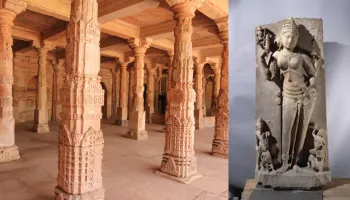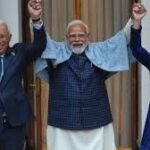Dhar Bhojshala, an ancient site located in Madhya Pradesh, has emerged as the latest battleground for Indian cultural nationalists following the contentious disputes over Ayodhya, Mathura, and Varanasi in Uttar Pradesh. This historic site, which holds religious and cultural significance for both Hindus and Muslims, is currently under investigation amidst escalating public sentiments and a volatile atmosphere.

Dhar Bhojshala, historically known as a center of learning and a site dedicated to Saraswati, the Hindu goddess of knowledge, has long been a point of cultural and religious contention. It is believed to have been established by Raja Bhoj, a prominent 11th-century ruler and patron of education and the arts. Over time, the site also became significant to the local Muslim population, who associate it with the Kamal Maula Mosque built during the medieval period.
The ongoing investigation and the rising tensions in Dhar are reflective of the broader nationalistic movements that have sought to reclaim and redefine India’s cultural and religious heritage. Cultural nationalists argue that Dhar Bhojshala, originally a Hindu site, should be restored to its former status, similar to the contentious campaigns for the Ram Temple in Ayodhya, the Krishna Janmabhoomi in Mathura, and the Gyanvapi Mosque in Varanasi.
In Dhar, the conflict is particularly sensitive because the site is actively used by both communities. Hindus perform Saraswati Puja, while Muslims offer Friday prayers at the Kamal Maula Mosque. The simultaneous use of the site by two religious groups has often led to tensions, especially during overlapping festivals and religious observances.
The issue of Dhar Bhojshala has significant political and social ramifications. For the Bharatiya Janata Party (BJP) and other right-wing groups, the reclaiming of such sites is a matter of cultural pride and historical rectification. These efforts are often framed as correcting historical wrongs committed during periods of Islamic rule in India.
The investigation into the site’s history and the calls for its reclamation have stirred local and national sentiments, with rallies, protests, and counter-protests becoming increasingly common. Political leaders have capitalized on these sentiments, sometimes exacerbating the divide for electoral gains. The rhetoric surrounding Dhar Bhojshala echoes the narratives seen in Ayodhya, Mathura, and Varanasi, where historical grievances are invoked to mobilize public support.
The Archaeological Survey of India (ASI) plays a crucial role in this unfolding drama. Tasked with investigating the historical claims surrounding Dhar Bhojshala, the ASI’s findings will be pivotal in shaping the future of the site. Any determination by the ASI that supports the claims of cultural nationalists could lead to significant changes in the site’s administration and use, potentially sidelining the Muslim community’s practices.So Public sentiments in Dhar are highly charged, with both Hindu and Muslim communities deeply invested in the outcome of the investigation. The potential for conflict is high, and the local administration faces the challenging task of maintaining peace and order while respecting the religious sensitivities of both communities.





Leave a Reply